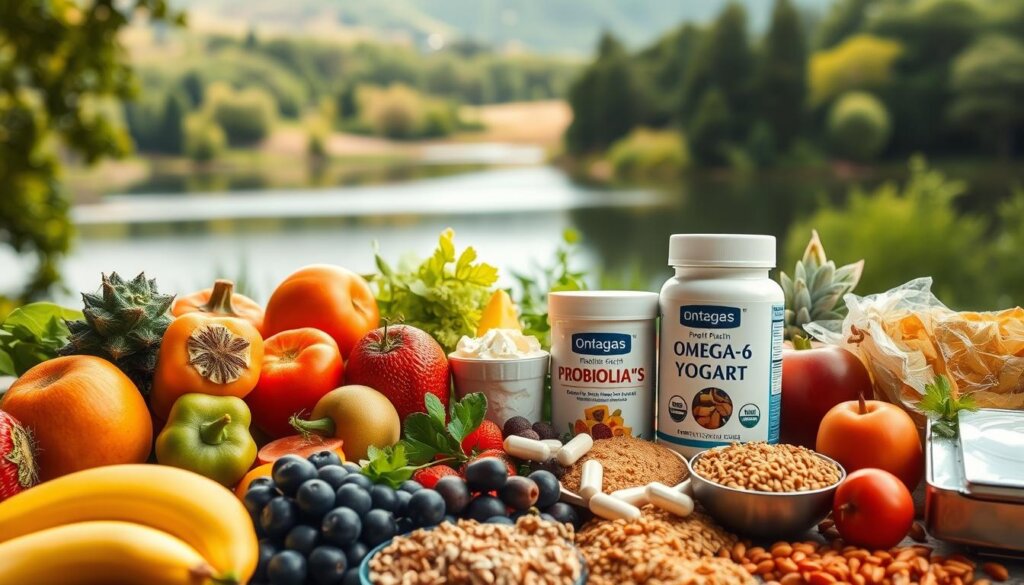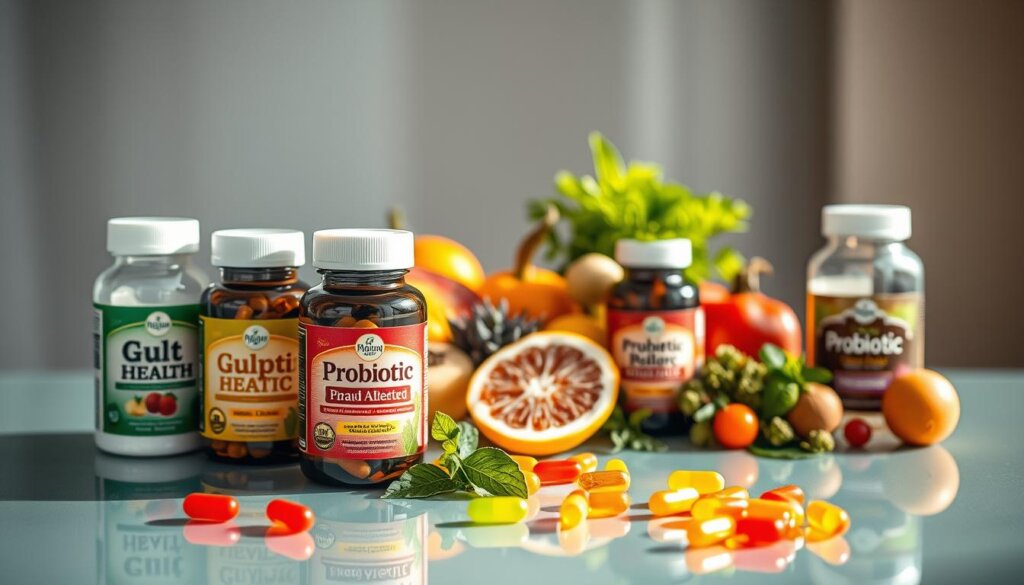Did you know your gut houses over 100 trillion microorganisms—roughly three times the number of stars in the Milky Way? These tiny residents, including 300-500 bacterial species, form a bustling ecosystem in your intestines. Far from just aiding digestion, they influence everything from immunity to mood.
Research shows a balanced gut microbiome supports energy levels, mental clarity, and even skin health. When these microbes thrive, they produce essential nutrients, regulate inflammation, and protect against harmful pathogens. But imbalances can lead to fatigue, brain fog, or frequent illnesses.
Wellness Group Malaysia specializes in personalized strategies to nurture this inner ecosystem. Their experts combine dietary adjustments, lifestyle tweaks, and targeted supplements to help clients achieve lasting wellness. Whether managing chronic issues or boosting daily vitality, small changes create big impacts.
Key Takeaways
- Your gut contains trillions of microorganisms critical for overall health
- Gut bacteria influence immunity, energy, and mental sharpness
- Microbiome balance affects multiple body systems beyond digestion
- Professional guidance simplifies gut health optimization
- Targeted lifestyle changes yield measurable wellness improvements
Ready to transform your health from the inside out? Contact Wellness Group Malaysia via WhatsApp at +60123822655. Their team offers consultations Monday-Friday 9:30 am-6:30 pm and weekends 10 am-5 pm.
Understanding Gut Health and Its Importance

Click to LEARN MORE
Your intestines host a living universe of microorganisms collectively called the gut microbiome. This community includes over 1,000 bacterial species, working like microscopic teammates to keep your body functioning smoothly.
Your Inner Ecosystem at Work
Beneficial bacteria break down food, extract nutrients, and create vitamins like B12 and K. They also train immune cells to recognize threats while reducing inflammation. Harmful microbes exist too, but a balanced microbiome keeps them in check.
Beyond the Digestive System
Researchers discovered gut bacteria produce neurotransmitters affecting mood and focus. Nearly 70% of immune cells reside near the intestines, constantly communicating with microbial allies. This explains why gut imbalances often correlate with fatigue or skin issues.
Modern stressors—processed foods, antibiotics, or chronic stress—can disrupt this delicate balance. Prioritizing diverse plant-based foods and stress management helps good bacteria thrive. When your microbiome flourishes, it supports every system from brain function to heart health.
What are the benefits of improving your gut health?
Imagine your digestive system as a high-performance engine—when well-maintained, it powers your entire body. A balanced microbiome does more than process food—it acts as a guardian against chronic conditions and boosts vital functions.

Boosting Digestion and Preventing Diseases
Friendly bacteria break down complex fibers, releasing nutrients like short-chain fatty acids. These compounds strengthen intestinal walls and reduce inflammation. Studies show optimized microbial balance lowers risks for colorectal cancer by 22% and type 2 diabetes by 34%.
| Benefit | Impact | Key Mechanism |
|---|---|---|
| Heart Health | 15% lower LDL cholesterol | Bile acid metabolism |
| Weight Management | Improved metabolic rate | Fat storage regulation |
| Disease Resistance | Reduced systemic inflammation | Immune cell activation |
Enhancing Immune and Brain Functions
Nearly three-quarters of immune system activity originates in the gut. Specialized cells called GALT (gut-associated lymphoid tissue) work with microbes to identify threats. This partnership explains why people with diverse bacteria experience 40% fewer seasonal infections.
“The gut produces over 90% of serotonin—a neurotransmitter governing mood and sleep cycles.”
Optimized microbial communities also support cognitive performance. They create BDNF proteins that enhance memory formation while reducing anxiety markers. Patients report better focus within 6-8 weeks of dietary improvements targeting their gut ecosystem.
Effective Dietary Choices for a Healthy Gut
Your plate holds the key to unlocking a thriving microbial community within. Strategic food selections directly influence which bacteria dominate your intestinal landscape. Colorful, fiber-rich meals act like fertilizer for beneficial microbes while crowding out harmful strains.
Emphasizing Fruits, Vegetables, and Fiber
Plant diversity matters more than quantity. Eating 30+ different fruits and vegetables weekly provides unique fibers that feed various microbial species. Berries feed bifidobacteria, while leafy greens nourish lactobacillus strains.
| Food | Fiber Type | Key Benefit |
|---|---|---|
| Chickpeas | Resistant starch | Boosts butyrate production |
| Lentils | Soluble fiber | Lowers inflammation |
| Whole-wheat pasta | Insoluble fiber | Supports regularity |
| Raspberries | Prebiotic fiber | Feeds Faecalibacterium |
Incorporating Fermented Foods and Probiotics
Traditional preservation methods yield microbial gold. Daily servings of fermented foods like kimchi or kefir introduce 10-15 billion live cultures per tablespoon. These probiotics bond with existing bacteria, creating protective biofilms.
Start small—add sauerkraut to sandwiches or swap soda for kombucha. Research shows consuming 6+ fermented foods weekly improves microbial diversity by 19% within 28 days. Pair them with fiber-rich meals for maximum probiotic survival.
“Regular fermented food consumption reduces pathogenic bacteria by 76% compared to standard Western diets.”
Lifestyle Strategies to Strengthen Gut Health
Daily habits shape your gut’s microscopic world more than you might realize. Beyond food choices, factors like stress patterns and movement routines directly influence microbial balance. Simple adjustments to daily living can create lasting improvements in digestive wellness and overall vitality.
Calming the Mind, Nourishing the Gut
Chronic stress triggers cortisol spikes that weaken intestinal lining over time. Just 10 minutes of daily meditation reduces anxiety markers by 31% while boosting beneficial bacteria growth. Pair deep breathing exercises with consistent sleep schedules—aim for 7-8 hours nightly.
Movement as Microbial Medicine

Click to LEARN MORE
Regular walks or yoga sessions increase microbial diversity by 22% in active individuals. Exercise stimulates gut motility, helping the body process nutrients efficiently. Even light activities like gardening or dancing maintain healthy inflammation levels.
| Strategy | Gut Impact | Action Steps |
|---|---|---|
| Stress Control | Preserves gut lining | 5-minute morning meditation |
| Sleep Optimization | Enhances bacterial diversity | Cool, dark bedroom by 10 PM |
| Physical Activity | Boosts digestion speed | 30-minute daily walks |
“Moderate exercise increases butyrate-producing bacteria by 40%—a key compound for colon health.”
Balanced routines work like tuning instruments—each element harmonizes with others. Combine stress management, movement, and rest to create ideal conditions for gut microbes to thrive.
Expert Guidance from Wellness Group Malaysia
Navigating gut health complexities becomes simpler with expert support. Wellness Group Malaysia tailors strategies to individual needs, recognizing that factors like medical history, stress patterns, and food sensitivities create unique microbial landscapes.
Your Roadmap to Microbial Balance
Consultations begin with analyzing three key areas:
- Current digestive symptoms and energy levels
- Dietary patterns affecting bacterial diversity
- Lifestyle factors influencing gut-brain communication
This approach identifies specific strains needing support. For example, low lactobacillus levels often correlate with sugar cravings, while insufficient bifidobacteria may cause irregularity.
Accessible Support for Lasting Results
Wellness Group Malaysia simplifies professional guidance through WhatsApp consultations. Reach their team at +60123822655 during these hours:
- Weekdays: 9:30 AM – 6:30 PM
- Weekends: 10 AM – 5 PM
Clients receive customized plans addressing their unique gut ecosystem. One recent case saw bloating reduce by 68% within three weeks through targeted prebiotic adjustments and sleep optimization.
“Personalized guidance helped me identify trigger foods I’d overlooked for years.”
Continuous support ensures strategies evolve as your microbial community changes. Whether managing chronic conditions or enhancing daily wellness, expert insights turn gut health goals into measurable progress.
Nutritional Supplements and Innovative Gut Solutions
Modern science reveals targeted supplements can amplify gut health progress when combined with smart eating habits. These tools work like precision gardeners—nourishing good bacteria while managing problematic strains.

Probiotic Powerhouses
Live microbial supplements repopulate the microbiome with strains like Lactobacillus and Bifidobacterium. Benefits include:
- 38% faster recovery after antibiotic use
- Reduced bloating in 72% of users
- Enhanced nutrient absorption rates
Products like Enterogermina® restore bacterial balance through spore-forming probiotics that survive stomach acid. For those seeking the best probiotic for bloating, multi-strain formulas often outperform single-species options.
Smart Supplement Selection
Quality matters—look for:
| Feature | Ideal Standard | Why It Matters |
|---|---|---|
| CFU Count | 10-50 billion/day | Ensures viable bacteria reach intestines |
| Strain Diversity | 4-10 verified strains | Targets multiple gut functions |
| Prebiotic Pairing | Inulin or FOS | Feeds newly introduced microbes |
Syncing Supplements with Meals
Take probiotics with breakfast—the morning pH helps bacterial survival. Prebiotic fibers work best when consumed 2-3 hours apart from antimicrobial foods like garlic. Gradual introduction prevents temporary gas as your microbiome adjusts.
“Combining specific probiotic strains with polyphenol-rich foods increases microbial diversity by 27% compared to supplements alone.”
Emerging solutions like delayed-release capsules and temperature-stable formulas now enhance supplement effectiveness. Pair these innovations with fermented foods and leafy greens for comprehensive gut health support.
Conclusion
Your gut’s influence extends far beyond digestion—it’s the foundation of total-body wellness. A balanced microbiome strengthens defenses against inflammatory bowel diseases while supporting nutrient absorption and immune responses. Research confirms diverse gut bacteria lower risks for chronic conditions affecting the intestine and overall health.
Small, consistent changes create lasting impacts. Prioritizing fiber-rich nutrition and stress management helps maintain microbial harmony. Those managing specific conditions like IBS or Crohn’s disease often see symptom improvements through targeted dietary adjustments.
Wellness Group Malaysia simplifies this journey with science-backed strategies. Their team crafts personalized plans addressing unique needs—from optimizing bacterial species balance to reducing stomach discomfort. Ready to transform your health? Message them at +60123822655 for expert guidance tailored to Malaysian lifestyles.
Every meal and mindful choice shapes your inner ecosystem. By nurturing gut health today, you invest in long-term vitality tomorrow.
FAQ
How does gut health affect the immune system?
A balanced gut microbiome supports immune function by regulating inflammation and fighting harmful pathogens. Around 70% of immune cells reside in the gut, making it critical for defending against infections and autoimmune conditions like inflammatory bowel disease.
Can improving gut health reduce digestive symptoms?
Yes. Prioritizing fiber-rich vegetables, fermented foods, and probiotics can ease bloating, stomach pain, and irregular bowel movements. These choices promote good bacteria growth, aiding digestion and reducing risks of irritable bowel syndrome.
What role does diet play in maintaining a healthy gut?
Diets rich in fruits, vegetables, and whole grains provide prebiotics that feed beneficial bacteria. Fermented foods like kimchi or kefir add probiotics, while limiting processed items prevents harmful bacteria overgrowth linked to chronic diseases.
How are stress and gut health connected?
Chronic stress disrupts the gut-brain axis, altering microbiome balance and increasing inflammation. Practices like meditation or yoga can lower stress hormones, improve sleep, and support a diverse bacterial community in the intestines.
Are probiotics necessary for gut health?
While probiotics from supplements or foods like yogurt boost beneficial bacteria, they work best alongside a fiber-focused diet. Consulting a nutrition expert, like those at Wellness Group Malaysia, ensures personalized strategies for optimal results.
Can gut health influence mental well-being?
Research shows the gut microbiome produces neurotransmitters like serotonin. Imbalances may contribute to anxiety or mood disorders, highlighting the importance of nutrition and lifestyle habits for both physical and mental health.






